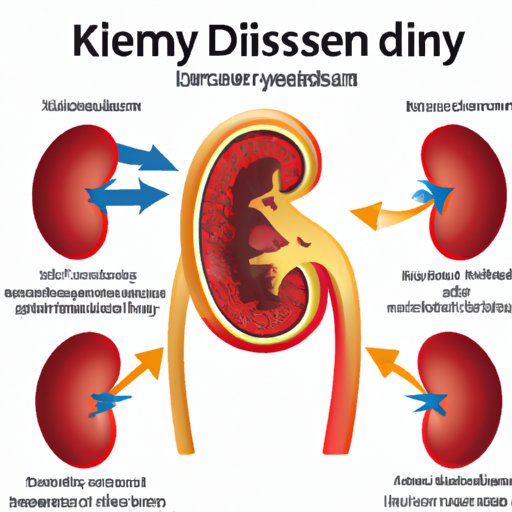
Introduction
Kidney diseases are more common than most people think. According to the National Kidney Foundation, about one in seven adults in the United States has chronic kidney disease (CKD). The kidneys are essential organs that filter waste and extra fluids from your blood. When the kidneys are damaged, they cannot function well, causing CKD. This article focuses on stage 3 kidney disease, which is a critical stage that requires proper management to prevent kidney failure.
Understanding Stage 3 Kidney Disease: Symptoms, Causes, and Treatment Options
Stage 3 kidney disease is a crucial stage of CKD where the kidneys lose approximately 50-70% of their functioning. At this stage, most people do not show any symptoms, so the disease is usually detected through routine medical checks or screenings. However, there are some specific symptoms to watch out for, such as:
– Poor appetite
– Fatigue
– Urination changes, including frequency and color
– Swelling in the hands, ankles, or feet
– Dry and itchy skin
– High blood pressure
These symptoms do not necessarily translate to stage 3 kidney disease. Still, if you experience any of them, it’s best to consult a doctor to help diagnose the root cause.
The primary cause of stage 3 kidney disease, like most kidney diseases, is hypertension or high blood pressure, which damages the small blood vessels and filters in the kidney. Other causes include diabetes, autoimmune diseases, family history of kidney diseases, and overuse of painkillers such as ibuprofen or naproxen.
Treatment options for stage 3 kidney disease aim to preserve the remaining kidney function, slow down the progression of the disease, and reduce symptoms. The treatment plan may vary based on the cause of the disease, other complications, and the patient’s overall health condition. Treatment options may include:
– Blood pressure medication to protect the kidneys
– Medications to control blood glucose levels in diabetics
– Medications to support red blood cell production
– Dietary changes to reduce stress on the kidneys
– Adequate hydration to ensure proper kidney function
Living with Stage 3 Kidney Disease: A Patient’s Perspective
A stage 3 kidney disease diagnosis can be overwhelming and scary. However, it’s important to remember that the right treatment can make a massive difference in your quality of life. Here are a few tips to help patients cope with the disease and live life to the fullest:
– Educate yourself- learn everything about the disease and how to manage it. The more you know, the more control you’ll have over your health.
– Follow your treatment plan- take your medicine as prescribed by the doctor, follow the recommended dietary restrictions, and maintain a healthy lifestyle.
– Seek support- Join support groups, talk to your family and friends about your condition, and get emotional support from a professional such as a therapist.
– Stay active- Engage in light exercises such as walking, yoga, or swimming. Regular exercise can improve circulation, lower blood pressure, and boost your mood.
Managing Stage 3 Kidney Disease: Lifestyle Changes and Medical Interventions
Lifestyle changes can significantly impact the treatment and progression of stage 3 kidney disease. Here are some common interventions:
– Dietary habits and exercise- A balanced and nutritious diet is essential for kidney health. Reduce your salt and sugar intake, avoid processed foods, and consume a moderate amount of protein. Exercise regularly to boost circulation and reduce stress on the kidneys.
– Medications – Medications may help alleviate anemia, regulate mineral level such as calcium, phosphorus, and vitamin D, and treat complications like urinary infections. Speak to your doctor about the best medications for you.
– Dialysis and transplantation- Dialysis is a treatment that involves using a machine to filter waste and extra fluid from your blood. A kidney transplant, on the other hand, is a surgical procedure that replaces a diseased kidney with a healthy one from a donor. In the case of stage 3 kidney disease, dialysis or transplantation is not often needed, but it’s an option for patients whose kidney function has severely declined.
Progression from Stage 2 to Stage 3 Kidney Disease: What You Need to Know
It’s important to note that CKD develops gradually and may progress to more advanced stages without proper management. The risk factors include hypertension, diabetes, family history of CKD, smoking, and obesity. Screening tests such as urine analysis, blood pressure checkup, and blood test can detect CKD in the early stages. If you’re at risk of CKD, make sure to get regular medical checkups.
Preventing Kidney Failure: Early Detection and Management of Stage 3 Kidney Disease
Early detection and management can significantly reduce the risk of kidney failure and related complications. People with stage 1 and 2 CKD, especially those with high-risk factors, should have regular checkups to detect the disease’s progression. Additionally, it’s important to manage modifiable risk factors such as hypertension and diabetes, maintain a nutritious diet, quit smoking, and stay active.
The Economic Burden of Stage 3 Kidney Disease: Exploring the Cost of Care
CKD can put a significant financial burden on patients and caregivers. The cost of CKD care includes hospitalizations, medications, lab tests, and dialysis or transplantation. Patients should consider their available health insurance and assistance programs to cover the cost of treatment.
Conclusion
In conclusion, stage 3 kidney disease is a crucial stage that requires early detection and proper management to prevent it from progressing to kidney failure. The best approach is to follow a healthy lifestyle, seek appropriate medical care, and consider medical interventions such as dialysis or transplantation when necessary. Remember, with regular checkups, proper disease management, and support from loved ones, many people with stage 3 kidney disease can lead fulfilling lives.




